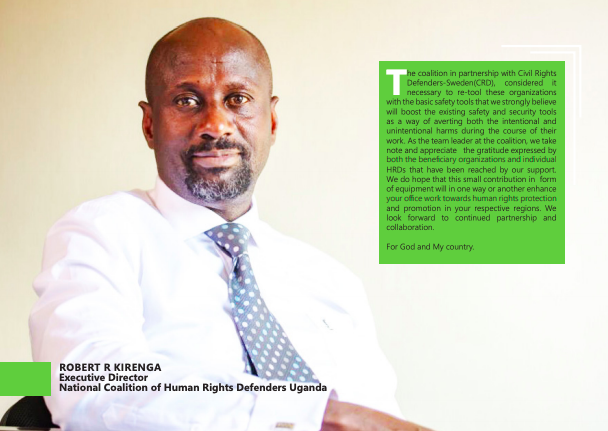
10 August, 2020
Uganda: Standing side by side with grassroot Human Rights Defenders
This Newsletter was first published by National Coalition of Human Rights Defenders Uganda
The coalition in partnership with Civil Rights Defenders-Sweden(CRD), considered it necessary to re-tool these organizations with the basic safety tools that we strongly believe will boost the existing safety and security tools as a way of averting both the intentional and unintentional harms during the course of their work. As the team leader at the coalition, we take note and appreciate the gratitude expressed by both the beneficiary organizations and individual HRDs that have been reached by our support. We do hope that this small contribution in form of equipment will in one way or another enhance your office work towards human rights protection and promotion in your respective regions. We look forward to continued partnership and collaboration. For God and My country
ROBERT R KIRENGA
Executive Director National Coalition of Human Rights Defenders Uganda
The effects have however been worst felt by HRDs advancing rights of the most marginalized communities in the remote areas of Uganda. The effects of the pandemic only weigh heavy on already existing challenges of HRDs. Over the years, HRDs in Uganda have reported various concerns affecting them including; a restrictive legal framework, office break-ins, physical assaults, arrests, harassment and intimidation by both state and non-state actors and other challenges. All these concerns appear to be associated with their work as HRDs. Such risks increase the vulnerability of HRDs and as such, they need to be reviewed from time to time due to the ever-changing context and in the face of the pandemic, these reviews are timely. The human rights situation within the natural resources sectors such as oil, land and other extractives in the Albertine (Hoima and Bulisa) continue to present concerns for various actors condemned by both the general public and religious leaders. Many multi-national companies are vested in oil-related activities at the expense of the rights of the local communities. This has created a lot of tension between HRDs and other actors which has resulted in serious threats towards the legitimate advocacy work of HRDs. Unlike the Albertine, Issues of land, cultural wrangles, transitional justice and Gender-based violence are the major issues prevalent in the Northern region. While many NGOs in Uganda face both direct and indirect threats, whether being singled out and targeted, or facing risks through proximity and circumstance they are increasingly aware that safety and security can no longer be viewed as a stand-alone component of wider NGO sustainability and resiliency, but that the threats they face (and the risks which result) must be approached from a holistic standpoint, understanding the ripple effects that an incident can have across the organization and the cascading risks that might result from a singular event. Early this year, the NCHRD-U capacity building team undertook a capacity needs assessment for human rights grassroots organizations in the Albertine and Northern region with the help of the focal persons.
Read the full Newsletter here



